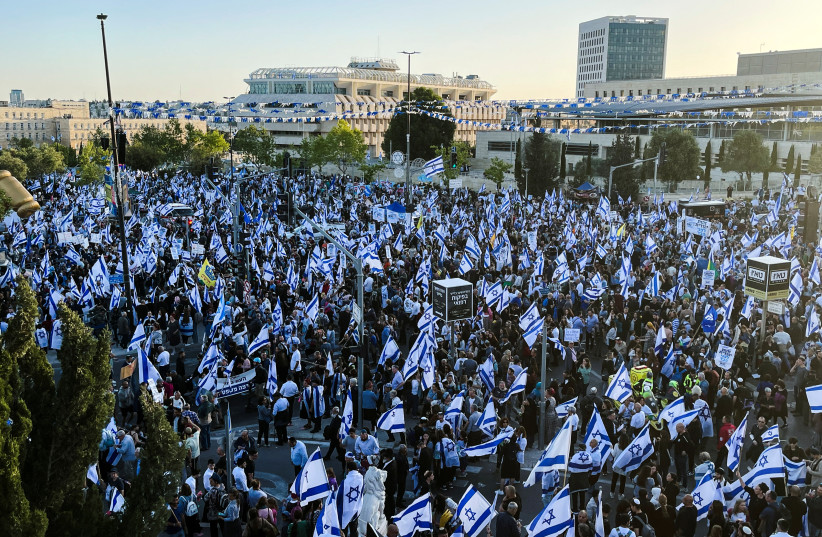Close your eyes for a moment and imagine it’s 2048 and final rehearsals are underway at Mount Herzl, Jerusalem, for Israel’s 100th Independence Day celebrations. In front of the tomb of Theodor Herzl, the founder of modern Zionism, flags fly proudly and soldiers march in formation.
Now, open your eyes and return to the present day as we marked this year’s Remembrance and Independence Days. The scenario of Israelis celebrating the country’s 100th anniversary as one people waving their flags together, seems, unfortunately, altogether fanciful.
If we do not ensure that we have a common ethos, it is doubtful we will get there – assuming that democracy even remains in place. So, will we celebrate 100 years of our independence together? Were we to hold a referendum, it is fair to assume that the answer to the question “Do you want to reach Israel’s 100th year of independence” would be “Yes,” but the answer to the question, “Will we get there,” will likely be “I don’t know.”
How to get to a 100 years
To provide a conclusive answer to this question, one must first understand the shared identity that propels us forward together – the same identity that creates the fabric of shared life here. The legal coup and the masses who take to the streets week after week are fighting for democracy and against dictatorship.
Yet it is not only the concern that the Israel we once knew is changing its character that is driving the protesters. Those who support the reform claim that the time is ripe for Israel to change its character and that the country has had enough of rulership by elites.

An identity struggle is raging: liberalism vs conservatism, those who share the national burden vs. those who believe that Torah study is an equally valuable endeavor to military service and work. The latter camp holds that Torah study is necessary due to the very existence of Israel, as the nation-state of the Jewish people.
The stage of defining our identity characterizes democratic states and research indicates that this process often occurs in its most intense form in the last quarter of a democracy’s first 100 years. In this respect, we are no different from most of the countries in the free world.
In other words, had the legal revolution not come, another catalyst would probably have led people to the streets, after shedding light on the rift between us reminding us of the feud over how to distribute the national burden and the argument over freedom of choice on how to manage one’s individual life.
Questions we have pushed aside for years due to our fight for our security and existence are now on the national agenda. The process of defining our identity is a complex and fragile process. In Israel, it includes the added and unique tier of being a Jewish, democratic country and the question of a shared identity is one that must consider both religion and state. The result is an equation that is difficult to provide answers for.
The first Independence Day
TO BETTER understand the question of a common ethos, we need to return to the basics. The young state of Israel marked its first Independence Day following the 1949 Independence Day Law. The date was set for the fifth of the Hebrew month of Iyar, the date on which Israel had declared independence a year earlier, in 1948. The Law was passed just three weeks before the celebration.
In fact, the 1949 celebration was not the first time Israel marked its independence. Almost a year earlier, on 20 Tammuz – July 27, 1948, the anniversary of Theodor Herzl’s death, military parades were held throughout the country to mark State Day. The idea was to emphasize the connection between the newly-born state and Herzl, the thinker who envisioned it.
The military’s prominent role in the ceremonies reflects what was, at that time, an undisputed ethos. The people’s army model became an essential element in defining the Israeli identity. There was a clear link between IDF service and Israeliness. The same model stands at the heart of the current divide today and brings to the fore the question of who is an Israeli.
Those who serve vs draft dodgers, the lack of equality in the sharing of the military burden and an unnecessary conflict between Israeliness and Judaism are harming the people’s army model. This will collapse one of Israel’s most important foundational pillars, upon which our identity, as a people and as a state, stands.
In a speech to the nation on Israel’s first Independence Day in 1949, then-prime minister David Ben-Gurion said, “We stood up to serious military campaigns [against us]. We emerged from them all intact and with dignity. However, the dangers to our safety and even our existence have not been eliminated, nor will they soon disappear.”
His remarks remain relevant today, as we mark 75 years of our independence. They indicate that the people’s army model has a key role in the fabric of our shared identity.
If we wish for our soldiers to march together on Mount Herzl in 2048 when we are due to celebrate 100 years of the wonder called Israel, then we are duty-bound to strengthen our common base and to preserve Israel as a Jewish and democratic state.
We won’t agree on everything, but we can create a common identity so that we can proudly say together, “We are Israelis.”
The writer is a publishing expert at The MirYam Institute. She served as an MK in the 24th Knesset, as well as the deputy head of the Kiryat Tivon Regional Council. She is a senior lecturer in academia and is a former journalist.
